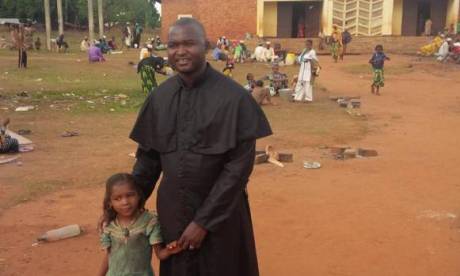A priest in the strife-torn Central African Republic is being hailed as a hero after saving the lives of hundreds of Muslims.
Fr Xavier-Arnauld Fagba opened his church doors to protect the Muslims from attacks by a militia, the Globe and Mail reports.
“They didn’t have anyone to help them,” said Fr Fagba, 31, who was ordained just four months ago.
“When the Muslims were attacked, the people didn’t help them,” he said.
“That’s when I decided to look for them and bring them here. I did it in the name of my faith. My faith asks me to transcend the most difficult obstacles.”
The Muslims at the church are members of the Peul minority, a community of traditional herders.
Accused of supporting atrocities by Muslim-led rebels who seized power in Central African Republic last year, they are often targeted for revenge attacks by the largely Christian anti-balaka militia.
But the people at the church say they never supported the rebels.
On January 16, after the rebels were pushed from power, anti-balaka fighters attacked the mosques in the town of Boali, about 100 kilometres north of the capital, Bangui.
One shepherd was outside a mosque, preparing to pray, when the militia attacked with guns and knives, killing seven people in front of him.
He rushed home and hid his wife and children.
Then the priest arrived, asking them to run to the church.
Fr Fagba rescued hundreds of Muslims that day, going house to house and even into the bush to find them.
On February 4, the militia attacked the church with machine gun fire, but no-one was hurt.
Dozens of African Union peacekeeping troops are posted around the church to protect the Muslims.
But venturing outside the church for food and goods is very dangerous for them.
On Sunday mornings, the Muslims get up early to clean the church and sweep the floors, so that it will be tidy when the Catholics arrive for Mass.
According to reports from Voice of American and Human Rights Watch, other priests in the Central African Republic are also making their church compounds available to shelter Muslims.
Sources
